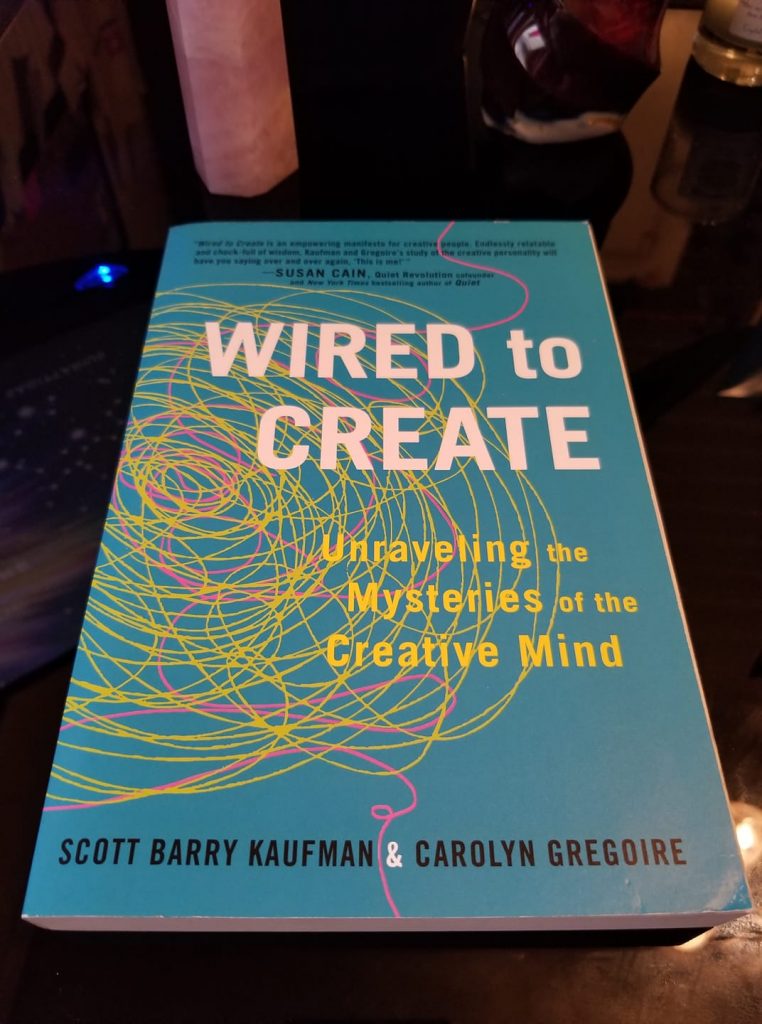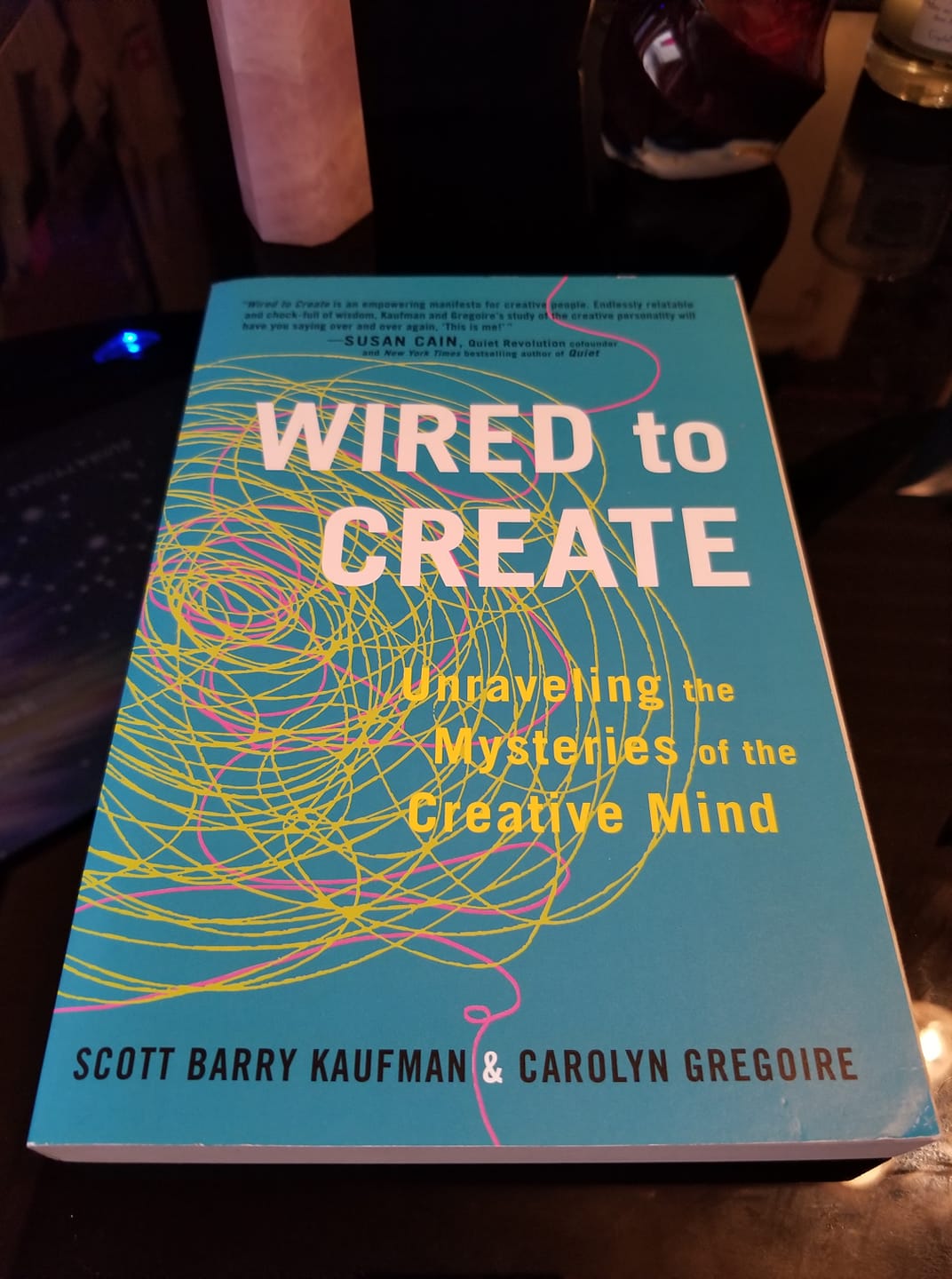In Week 1 of 52 Books in 52 Weeks, we read Wired to Create. This book caught my eye in Barnes & Noble last year, but I had not gotten around to reading it yet. I was very excited to make it the first book on my reading list for 2020.

It did not disappoint.
A member of the group asked, “This book looks interesting. Is it practical or informational or both?”
Great question! My answer when I was only a couple of chapters in:
“So far, I think it’s both. It’s not a “how-to” per se, with assignments or anything, but it gives you the ways creative people think differently, why they think that way, examples of famous people who exhibit these characteristics, and then ways to use it to your advantage.
The chapters are set up around the 10 Things Creative People Do Differently:
- Imaginative Play
- Passion
- Daydreaming
- Solitude
- Intuition
- Openness to Experience
- Mindfulness
- Sensitivity
- Turning Adversity into Advantage
- Thinking Differently
It’s referenced like a research study with pages of notes in the back that dictate the sources they used so you can do further reading on parts that interest you. I really liked that this part makes it scientific, versus some people just stating their opinions. “
Get it yourself here:
Is it possible to make sense of something as elusive as creativity?
Based on psychologist Scott Barry Kaufman’s groundbreaking research and Carolyn Gregoire’s popular article in the Huffington Post, Wired to Create offers a glimpse inside the “messy minds” of highly creative people. Revealing the latest findings in neuroscience and psychology, along with engaging examples of artists and innovators throughout history, the book shines a light on the practices and habits of mind that promote creative thinking. Kaufman and Gregoire untangle a series of paradoxes— like mindfulness and daydreaming, seriousness and play, openness and sensitivity, and solitude and collaboration – to show that it is by embracing our own contradictions that we are able to tap into our deepest creativity. Each chapter explores one of the ten attributes and habits of highly creative people:
Imaginative Play * Passion * Daydreaming * Solitude * Intuition * Openness to Experience * Mindfulness * Sensitivity * Turning Adversity into Advantage * Thinking Differently
With insights from the work and lives of Pablo Picasso, Frida Kahlo, Marcel Proust, David Foster Wallace, Thomas Edison, Josephine Baker, John Lennon, Michael Jackson, musician Thom Yorke, chess champion Josh Waitzkin, video-game designer Shigeru Miyamoto, and many other creative luminaries, Wired to Create helps us better understand creativity – and shows us how to enrich this essential aspect of our lives.
My Review
Scott Barry Kaufman, PhD and Carolyn Gregoire combine their talent to create an amazing book that’s getting a lot of attention. It gives readers a close look at what goes on inside the mind of highly creative people. If you have an interest in what fuels creativity like I do, Wired to Create: Unraveling the Mysteries of the Creative Mind is a must-read!
Dr. Scott Kaufman is a cognitive psychologist and the scientific director of the University of Pennsylvania. He uses his knowledge of the imagination, intelligence and the development of creativity to give you a scientific look at what goes on in the minds of creative people. It’s a fascinating way to view the creative mind.
Carolyn Gregoire is the author of 18 Things Highly Creative People Do Differently and a high-ranking writer for the Huffington Post. Her reports focus on mental health, neuroscience, and psychology. These two professionals combine their research with amazing storytelling to explain creativity in a way that keeps you interested. So, what exactly does the book cover? Below are a few of the highlights I found most interesting.
Wired to Create Highlights
Wired to Create contains well-known, previously documented information in addition to new, interesting facts. For example, the authors explain how things like daydreaming, mindfulness, intuition and imaginative play contribute to creativity. While this is not new information, there were a few things that really stood out to me.
For one, it’s well-known that personality traits, such as a person’s I.Q. and thought patterns play a role in how creative you are. However, Dr. Kaufman’s research shows that trying new things in different areas of your life play an even bigger role.
The authors explain that being open to new adventures and things in general “may be the single most important personal factor predicting creative achievement”. In other words, all the things you encounter and experience throughout life have an impact on just how creative a person becomes.
Kaufman and Gregoire explain that the whole brain produces creativity. It’s not just the right side as previously thought, which is another thing that stood out to me. I found this to be very interesting and exciting news! It’s amazing to me how the different parts of the brain perform various functions that all work together as one system. The authors call it the “imagination network”.
Over the last fifty years, scientists have learned many new things about the nature of creativity. For example, Kaufman and Gregoire write “Creativity is a process that reflects our fundamentally chaotic and multifaceted nature,” and “It is both deliberate and uncontrollable, mindful and mindless, work and play.” In simple terms, they’re saying that creative people are complicated and hard to follow because creativity is more unpredictable and spontaneous than previously thought.
A creative person’s thoughts and ideas are random and full of contradictions. Their brains are messy with all kinds of things running their heads all at once. However, once they choose a subject they want to pursue, they focus more intently on making their vision a reality than non-creative people do.
They recognize and take advantage of good ideas when they come along and understand that when the creative juices just won’t flow, you might as well set back and relax until they do. You can’t force your mind to be creative.
Overall View of the Book
I found Wired to Create: Unraveling the Mysteries of the Creative Mind fascinating. Scott Kaufman and Carolyn Gregoire took accurate, scientific-based research on the psychology that drives the creative mind and turned it into amazing stories that are fun, informative and engaging to read.
I always considered myself to be creative and after reading this book, I have a better understanding of how the creative mind works. As a result, I feel like I understand myself a little better. The book provides an excellent overview of all the research done on creativity to give you a new perspective on how to approach and nurture creativity in children and throughout adulthood.





